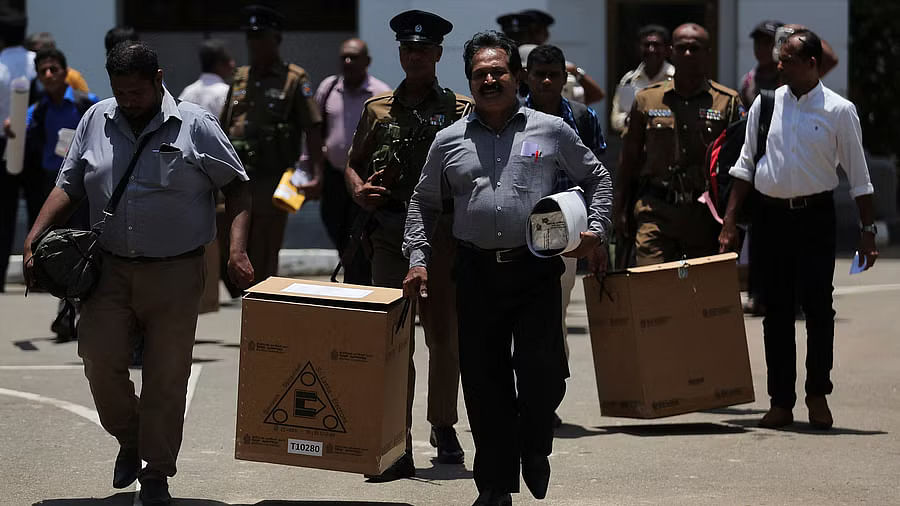
This is the first time in the country's history that a second preference of counting is done.
Credit: Reuters Photo
Chennai: For the first time in the country’s history since Executive Presidency came into being, Sri Lankan Presidential elections on Sunday headed into another round of counting to calculate the second preference votes for two frontrunners -- Anura Kumara Dissanayake and Sajith Premadasa.
The counting of second preference votes was necessitated after none of the candidates secured the required 50 per cent plus one vote as mandated by the Sri Lankan Constitution. As the counting began late Saturday, Anura continued to establish a lead of about 20 per cent over Sajith but the percentage began to narrow down since Sunday morning with the difference between the two coming down to just five per cent.
At 12 noon Sunday, poll results showed Anura secured 27 lakh votes (39.52 per cent), while Sajith polled 23.48 lakh votes (34.28 per cent) and incumbent Ranil Wickremesinghe was pushed to a distant third with 11.92 lakh votes (17.41 per cent).
Namal Rajapaksa, the SLPP candidate and eldest son of former President Mahinda Rajapaksa, came a cropper by securing a mere 1.6 lakh votes (2.38 per cent), even trailing behind Ariyanethran Pakkiyaselvam, the common Tamil candidate who polled 2.10 lakh votes (3.07 per cent).
Chairman of Sri Lanka Election Commission R M A L Ratnayake told a press conference Sunday afternoon that the counting of second and third preference votes for the two frontrunners – AKD and Sajith – has begun, which will delay the publication of results.
Under Sri Lanka’s Constitution, the run-off is conducted between the first two frontrunners by eliminating all other candidates. The counting agents will then count the second and third preference votes of the eliminated candidates to announce the winner.
This is the first time that the country has gone into a run-off in the Presidential polls ever since the Executive Presidency was introduced in the late 1970s.
However, Anura’s camp told Daily Mirror newspaper they were confident that AKD will emerge as the winner and that he will take oath as the country’s next President by Monday.
The initial results showed deep divisions between the majority Sinhala and minorities like Tamils, and Muslims. While Sajith and Ranil secured more votes in Tamil-dominated Vanni, Jaffna, Trincomalee, Batticaloa, and Puttalam, it was all the way Anura in Sinhala-majority areas like Hambantota, the home district of the Rajapaksas.
Anura’s likely ascent to Sri Lankan Presidency is meteoric as he secured a mere 3.2 per cent votes in the 2019 Presidential polls that saw Gotabhaya Rajapaksa claiming a landslide victory on national security plank following the deadly Easter blasts.
However, his key role in the 2022 Araghalya protests against the Rajapaksas and the political class caught the imagination of youngsters and old alike, who seem to have put their weight behind the Marxist-leaning party leader.
A ”fundamental change” in Sri Lanka’s political landscape was AKD’s war cry as he highlighted the sufferings of the masses during the economic crisis like 17-hour power cut, long queues outside shops, inflation soaring to new heights, and sky-rocketing prices of essential commodities in his campaign.